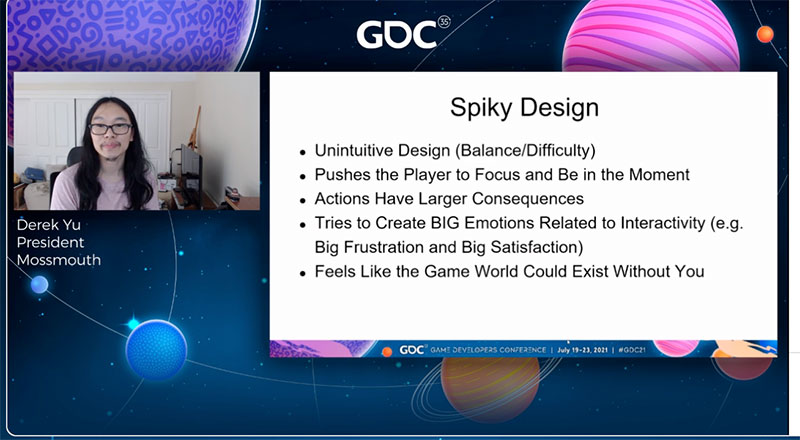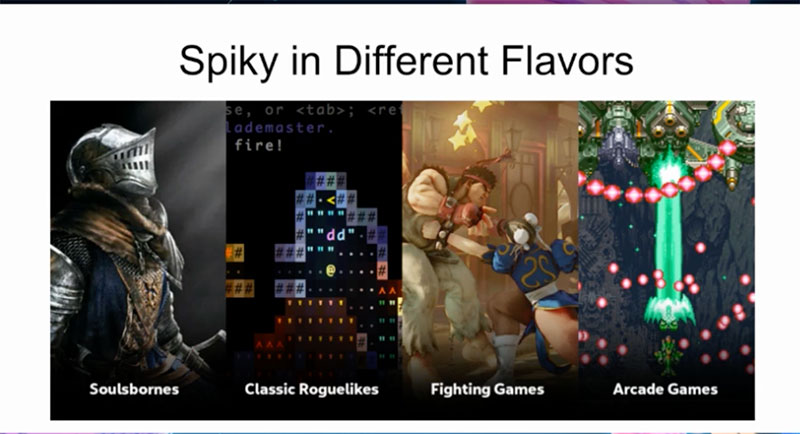
These are the high-level TL;DR notes of Derek Yu’s talk about the success and challenges of making Spelunky 2.
This talk really isn’t about marketing but Derek is a very rare designer who manages to make amazing games, write well, and can explain game design without getting too woo-woo or academic. His book about the making Spelunky is a must read. His blog posts like this one about finishing your game are a must read (especially for this talk)
Development of Spelunky 2
- Why roguelikes? You can expand on the base formula (The Berlin definition is a very core level and few rogues actually follow these guidelines). It has randomness which is great.
- Why he thinks the design of Spelunky works? Destructible terrain, enemies are similar to the player and have similar behavior. There are surprising combinations of elements in the game. The game encourages creative solutions.
- Spelunky 2 development tools were much more sophisticated and robust compared to what he had in Spelunky 1. But he doens’t think everyone should spend so much time on tools. Sometimes developing tools takes away from actually working on the game and if you have great tools that doesn’t mean you work faster, it can mean you just create more complex designs. Work fills time basically.
- The art of Spelunkt 2 was a bit of a departure from the first one. He called the art in Spelunky 1 as “Rocky Crunchy Granola” and wanted the second to be a bit easier to read; not as much detail so it doesn’t distract the eye. BUT he said that because of the simplified art, the first trailer made the game art look too simple and fans reacted negatively to it. Which leads to his next point…
- A trailer is a great first object to get fan feedback on. You get unvarnished feedback from random internet haters. It is harsh but it is good to have that general public reaction before you actually finish the game.
- Spelunky 2 has a quest system which is really hard in a platformer because you can’t repeat quests as easily as you can in an RPG. He thinks RPGs get away with it because characters, dialog, and story are a secondary attraction and can enhance an otherwise repetitive fetch quest. Platformers don’t have that luxury. (CZ NOTE: observations like these are why I love reading / watching / listening to Derek on game design.)
- Multiplayer was really hard because there are so many objects, 4 players, and because it is a platformer all physics must be quite precise. This was VERY hard.
- Spelunky 2 also had so much more art. Hundreds of frames of animation because he actually animated actions such as swimming and holding things. He brought in an artist to help for the first time.
Spiky Design

- Derek defines a new term: Spiky Design. He says these are games that are hard but the difficulty is more in service of the goal as opposed to the only goal.
- Spiky design is used to put the player in a state of focus to care at any moment.
- Spiky design: It is to make the world feel like it will exist outside of you as the player and will exist even after you are done playing here. Winning is not necessarily the goal.
- Games can be spiky and soft at the same time. For instance he considers Spelunky 2 softer than Spelunky 1.
- He actually considers Animal Crossing to have some Spiky design. The UI is spiky. To do many actions (like eating 100 peaches) is very cumbersome and annoying. But that is in service to the design to slow you down and enjoy the world and not min max it. That is spiky design.

Sequels for indie games?
- Why make a sequel to Spelunky? Derek had more potential and more ideas and also most of the effort of making Spelunky 1 was just figuring out what the genre of 2D roguelike was. Now that it was established he could really come up with more ideas. Also he just wanted to show indies that YES you can make a sequel. You don’t have to move on after every single project.
- So how to make sequels? You just make things bigger. Think of the Bullet Bills from Super Mario 1 to Super Mario World.
- Also increase the interaction – he made it so cave men can pick up objects and just chat to each other.
- Why indie Sequels “Game designers value novelty, but players are actually pretty excited to get more of what they already love” (CZ NOTE: Which is exactly why players are so genre focused. They like genres more than we do. They often like Anchors more than Hooks)
Launch and Release
- Derek spent a lot of time developing Spelunky 2 and UFO 50 at the same time. He actually thought it was good because he could switch his brain and keep things fresh when he got tired of one of the games. Spelunky during day and UFO 50 at night. However, as launch closed in he had to admit that it was too hard to do both and work only on Spelunky. (CZ Note: I am going to be stricter than Derek, don’t try and do 2 projects simultaneously. He is one of the greatest indie designers and if he can’t release 2 games simultaneously, you can’t. Don’t switch horses mid ride.)
- He decided to release Spelunky 2 in 2020 even though mega sized roguelite Hades was launching at the same time. Derek says “There is never any guarantee that if you wait there will be a better window.” (CZ Totally agree, I think indies in general overthink their launch timing avoiding other games. Just launch when your game is ready, don’t over think).
- Second game launch was much easier than the first: Press sought them out because they were familiar with their game, fans know what Spelunky is (CZ NOTE: Your second, third, fourth games will always be better, dont give up)
- If you are deep in development of a game and come up with a new idea and want to abandon your current project, write your new idea down and move on. Typically writing it down gets it out of your system so you don’t have to change projects and you can finish your primary game.
- Making Games is a Long Term Goal – Derek experimented with the original low-res Spelunky for 6 months and released it free. The audience liked it so much that it made it obvious to work on a bigger version of it. (CZ NOTE: This is how you avoid getting stuck working for years on a game that nobody actually wants.)
- His prediction Roguelikes are here to stay.